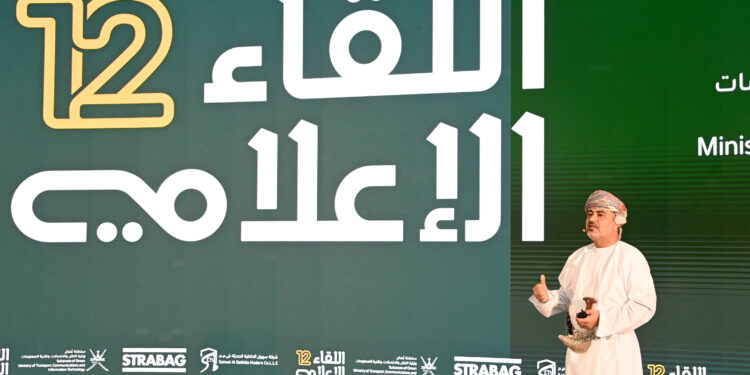The Ministry of Transport, Communications, and Information Technology (MTCIT) convened its 12th media gathering to present its executive plan for 2025 and review achievements from 2024.
Economic Contributions and Investments
Engineer Said Hamoud Al Ma’awali, Minister of Transport, Communications, and Information Technology, reported that the logistics, communications, and information technology sectors collectively contributed over OMR 2 billion to the Gross Domestic Product (GDP), accounting for 8% of the total. By the end of 2024, investments in these sectors reached OMR 2.5 billion. Development project expenditures totaled OMR 989 million, with 93% allocated to the road network. Notably, change orders decreased by 42% compared to 2020.
Employment and Omanization Initiatives
In 2024, employment and Omanization programs saw reductions of 21% and 38%, respectively. The on-the-job training initiative in the maritime sector enrolled 124 Omani jobseekers, while 333 Omanis secured specialized positions in road project companies overseen by the ministry. Additionally, the Female Taxi Drivers Initiative registered 52 new taxis. Over 2,000 Omanis were employed in IT roles, and a decision was made to Omanize eight professions in the communications and IT sector as a first phase. Since its launch, the “Makeen” initiative has trained over 8,000 graduates and jobseekers, benefiting 2,700 individuals in 2024. Furthermore, 19 activities were approved in the IT sector for freelancers.
For 2025, the ministry aims to increase the proportion of Omanis in technical, specialized, and leadership positions within the transport and logistics sector by 10%. In the communications and IT sector, the goal is to raise Omanization to 41%, with a 2% increase in technical and leadership roles. Plans also include training an additional 1,000 beneficiaries through the “Makeen” initiative and developing a framework to stimulate local content, ensuring sustainable employment.
Infrastructure and Port Development
From 2020 to 2024, road construction, restoration, and maintenance projects exceeded OMR 1 billion. The ministry maintains a high-efficiency road network to ensure sustainable safety. The 2025 plan includes 30 projects worth over OMR 800 million, covering more than 700 kilometers of roads. These projects encompass the completion of strategic roads, restoration efforts, and links to logistic and tourism projects.
In 2024, Omani ports demonstrated efficiency among regional facilities. They handled over 107 million tons of general, liquid, and bulk goods, more than 4 million standard containers, over 3 million heads of livestock, received over 10,000 ships, and accommodated more than 325,000 passengers. In 2025, the ministry plans to adopt the Omani Ports Development Strategy (2025-2040), sign long-term concession agreements for Khasab, Shinas, and Dhalkut ports, and launch the “Port Community Platform” for electronic shipment linking. Maritime affairs revenues exceeded OMR 1 million in 2024.
Environmental Initiatives
In 2024, the ministry launched 25 initiatives and projects targeting zero-carbon neutrality in the transportation sector, achieving a 100% completion rate in major projects. Plans for 2025 include establishing the first hydrogen station in Oman, launching a unified platform for electric chargers, implementing an executive plan to replace government vehicles with electric ones in stages, expanding infrastructure for electric vehicle charging, and initiating the green lanes project for hydrogen-powered trucks.
Digital Transformation and Space Sector
The ministry aims to launch the unified national portal for e-government services in 2025, making 80% of basic priority government services available online and achieving an 80% maturity level in digital transformation within the government sector. Projects include launching the first phase of the Omani language model, establishing the Artificial Intelligence Studio, launching the National Open Data Platform, and operating the Fourth Industrial Revolution Center.
Efforts in the space sector involve implementing the second phase of the Space Engineering Laboratory project in collaboration with Sultan Qaboos University, executing the second package of the National Capacity Building Program in the space sector, and continuing to assess government and academic institutions related to space. The ministry also plans to update laws, including the Electronic Transactions Law, the Communications and Information Technology Regulatory Law, and the Anti-Information Technology Crimes Law, alongside developing bylaws for regulating government digital transformation.
Additional Insights
Eng. Khamis Mohammed Al Shammakhi, Undersecretary for Transport, noted that 90% of transport projects initiated in 2024 have been completed. The ministry is working to maximize benefits from the ports sector and encourage further investments, including specialized initiatives for tourism projects in Jabal Shams, Al Jabal Al Akhdar, and Al Jabal Al Abyad. Dr. Ali Amer Al Shidhani, Undersecretary for Communications and Information Technology, highlighted efforts to upgrade the electronic authentication system and ongoing digital transformation initiatives to achieve integration in government services. He also mentioned the establishment of the 4IR Centre in Oman, in cooperation with the World Economic Forum, to leverage international expertise and enhance Oman’s presence in global forums.












